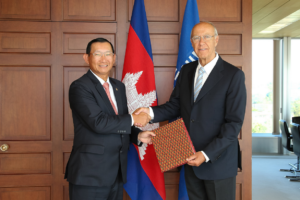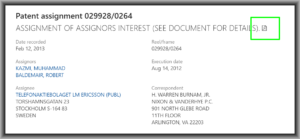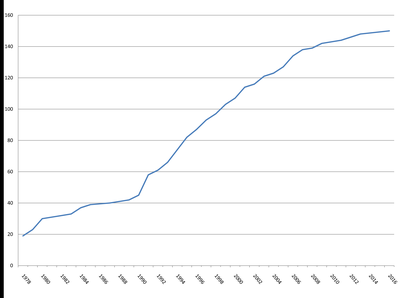 Cambodia deposited its instrument of accession to the PCT on September 8, 2016. This event brings the number of PCT members to 151.
Cambodia deposited its instrument of accession to the PCT on September 8, 2016. This event brings the number of PCT members to 151.
The Treaty will enter into force on December 8, 2016.
The two-letter code for Cambodia is KH.

Bluesky: @oppedahl.com
The search fee for ISA/JP will increase today for US PCT filers. For a US PCT filer whose PCT application is filed in English, the search fee was previously $1378. Starting today, it will be $1530.
John Marshall Law School is sponsoring a PCT Seminar on Thursday and Friday, O ctober 20-21, 2016. From the brochure:
ctober 20-21, 2016. From the brochure:
This two-day seminar offers an examination of current practice with regard to the PCT system for patent professionals. A half-day session will focus on an overview of the PCT system, the most recent and future developments in the PCT system as well as covering some of the most important strategic decisions that need to be taken when using the PCT system. This will be followed by a day and a half looking at a detailed analysis of the PCT system, covering best practices and sophisticated tips about the procedural aspects of the PCT. It will cover the process from start to finish including the filing of the applications, preparing the international search, the preliminary examination, and eventually entering the national phase before designated Offices. This course will also offer a platform for the participants to discuss more complex and unusual scenarios and to discuss particularly interesting real-live cases put forth by the instructors or by the attendees’ own experience.
The location is John Marshall Law School, 315 South Plymouth Court, Chicago, IL (map).
The presenters are Matthias Reischle, Deputy Director, PCT Legal Division, WIPO, and yours truly.
To learn more or to register, click here.
We remember those bad old days when DO/EO/US was taking a year and a half to get around to mailing a Filing Receipt in a newly filed entry into the US national phase. The backlog of unattended-to US national-phase filings had gotten so bad that DO/EO/US had to set up a special processing queue for cases in which the applicant had filed a PCT-PPH petition. The idea was that a case deserving of “special” status should not languish for a year or more just because DO/EO/US had fallen so far behind.
Within the past year or two DO/EO/US has managed to be much more prompt about this important task of mailing Filing Receipts. And along with this improvement, DO/EO/US had dropped the special processing queue for cases in which the applicant had filed a PCT-PPH petition.
And indeed in recent months we have seen stretches of time during which many cases were receiving their Filing Receipts a mere two or three weeks after the date that the applicant has perfected the entry into the US national phase.
What’s a bit baffling, however, is to see that there is now more of a spread in the period of delay at DO/EO/US. While a large plurality of cases recently do receive their Filing Receipts promptly (within two or three weeks), an ever-growing fraction of cases sit for some months, untouched by DO/EO/US.
For a case that was not going to get examined any time soon, this is perhaps not a big deal. But for a case in which a Highway petition has been filed, the lack of attention by DO/EO/US goes against USPTO’s policy reasons for supporting the Patent Prosecution Highway in the first place.
What shines a bright light on this is the recent super improvement by the Office of Patent Petitions which, after falling terribly behind, has in recent months done much better in handling of Highway petitions. A year ago it was commonplace to see Highway petitions that had languished for six or seven months untouched by the Office of Patent Petitions. But nowadays the OPP gets kudos for granting Highway petitions in just two to four weeks.
So back to the promptness of DO/EO/US to mail Filing Receipts. As I say, these days a large plurality of cases recently do receive their Filing Receipts promptly (within two or three weeks). But we have cases with granted Highway petitions that still do not have a Filing Receipt despite having the national phase perfected as long ago as May 25 (about four months ago).
One wishes that the managers of DO/EO/US would generate a report from time to time that lists old cases that lack Filing Receipts, and that somebody would try to figure out why the old cases don’t get worked on. Are the laggard cases all assigned to particular laggard workers, for example? I assume that many workers in DO/EO/US work from home. Are the laggard cases all assigned to people who work from home?
The USPTO did a nice thing today. As of today, you can receive a PDF copy of a recorded patent assignment!
can receive a PDF copy of a recorded patent assignment!
Until now, the only way to get a copy of a patent assignment was to place an order with the Order Entry Management System and pay $25. And then wait a couple of weeks for the copy to show up in the mail.
But now, thanks to alert reader Rick Neifeld, I have learned that you can get it for free, and you can get it instantly. The way to make this work requires the user to learn a few steps, but once you learn it, it’s easy.
A first thing to appreciate is that you can’t start with the “assignments” tab of PAIR. You need to go to Assignments on the Web (Patents). Then do a search. You can search on any of the usual things — application number, patent number, whatever. Eventually you will figure out the reel and frame number that you care about. Click on the reel and frame number to get to a page that is specific to your reel and frame number. You will then see a page like the screen shot above (click on the image to see it bigger). Look for a barely visible icon just to the right of the word “details” (marked with a green rectangle), and click on it. What will pop up is a PDF copy of the recordation cover letter and the assignment itself.
This is a welcome development at the USPTO! USPTO deserves kudos for providing this helpful service.
A member of the EFS-Web listserv posted this question to the listserv earlier today:
His question is a very interesting question. Here is the answer. Continue reading “USPTO patent application numbers way out of sequence?”
As you may see here, I will be teaching some classes about the Patent Cooperation Treaty in the next few months. These include:
On September 26 and 27 (a Monday and a Tuesday), WIPO will conduct an advanced seminar on the Patent Cooperation Treaty. To register and to find out more, click here. Here is WIPO’s description of the seminar:
This PCT seminar is targeted towards patent administrators, paralegals and other users who are already familiar with the PCT System. This is a unique opportunity to learn more about the procedural details of the PCT system and some of the best filing and practice strategies, directly from PCT experts of the International Bureau of WIPO. Prior completion of the introductory PCT distance learning course is highly recommended.
The twentieth annual AIPLA PCT Seminar will take place July 25 and 26 (Monday and Tuesday) in Alexandria, Virginia. It’s time to sign up if you have not already signed up.
This Seminar is different from other PCT programs in that it has not only official patent office presenters but also practitioners. Among the presenters are a speaker from China and a speaker from Europe, and they will talk about how to draft a PCT patent application with China and Europe in mind. They will also talk about the process of entry into the Chinese national phase and European regional phase.
Yours truly is among the presenters.
To register, or to find out more, click here.
Djibouti has joined the PCT. This brings the number of members to 150. You can read about this here. Djibouti deposited its Instrument of Accession with WIPO on June 23, 2016. As a consequence, any PCT application filed on or after September 23, 2016 will automatically designate Djibouti.
The two-letter code for Djibouti is DJ.
Seeing the tot al now at 150 makes me think back to when I filed my first PCT application, in about 1986. At that point the PCT was about eight years old, and the number of member states was about forty. This graph shows the number of member states.
al now at 150 makes me think back to when I filed my first PCT application, in about 1986. At that point the PCT was about eight years old, and the number of member states was about forty. This graph shows the number of member states.